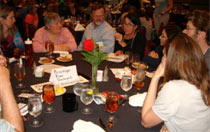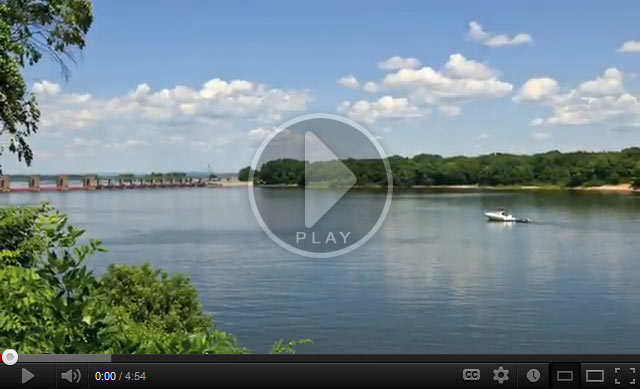| | | | River Currents Newsletter - September 2012 | | | Q.: What do Integrated River Basin Management and Civic Engagement Have In Common? A.: Stakeholder Involvement in Mississippi River Planning
Two eminent organizations, working diligently in their separate spheres of influence and at separate times, have outlined formulas for successful practices they hold dear: integrated river basin management and public  engagement. The two organizations are substantially different in their goals, membership and scientific realms. Nevertheless, a recent research project brought several components of each into unwitting alignment. The outcome: Another case for public engagement and integrated river basin management for the Mississippi River. engagement. The two organizations are substantially different in their goals, membership and scientific realms. Nevertheless, a recent research project brought several components of each into unwitting alignment. The outcome: Another case for public engagement and integrated river basin management for the Mississippi River.
.
On its web site the World Wildlife Fund puts forth a holistic approach to planning for the ecosystem-based functioning of a river basin. Their seven key elements include, among others: | - Integration of policies, decisions and costs across sectoral interests such as industry, agriculture, urban development, navigation, fisheries management and conservation, including poverty reduction strategies
- Active participation by all relevant stakeholders in well-informed and transparent planning and decision-making
- Adequate investment by governments, the private sector, and civil society organizations in capacity for river basin planning and participation processes.
| | And then on its web site, the National Center for Deliberative Dialogue posts the seven core principles of public engagement, agreed to by 80 organizations in 2009. In one of those strange twists of fate, at least three of their principles sound similar to the WWF's list above: | - Equitably incorporate diverse people, voices, ideas, and information to lay the groundwork for quality outcomes and democratic legitimacy.
- Support and encourage participants, government and community institutions and others to work together to advance the common good.
- Be clear and open about the process and provide a public record of the organizers, sponsors, outcomes and range of views and ideas expressed.
| Coincidentally, these two seemingly divergent organizations are seeing the need for a process that meets certain criteria in order to achieve their respective outcomes. Speakers on a recent Community Matters conference call emphasized another key ingredient. Both Larry Schooler of IAP2 and Eric Gordon, college professor and tech guru, stressed the need for public engagement standards, something often overlooked in earnest efforts to get public feedback and input.
WWF and NCDD have set standards for their respective disciplines. As we search for ways in the 21st century to integrate all the various concerns, disciplines and goals for the whole Mississippi River watershed, we would do well to acquaint ourselves with the work of other professionals that informs and models standards for our own efforts. The principles above, among others, should certainly be included.
America's Waterway Introduces New Video |  | | | | America's Waterway makes a case for a 21st century approach to planning for the whole Mississippi River and its watershed. | | | Events Upcoming on the River……
Mississippi River Cities and Towns Initiative Gets Underway
 The Northeast Midwest Institute received a grant from the Walton Family Foundation to create a new and influential voice for the Mississippi River dramatically increasing the demand for effective river protection, restoration and management in Washington, D.C. They kick off the initiative Sept. 12 – 14 in St. Louis. The Northeast Midwest Institute received a grant from the Walton Family Foundation to create a new and influential voice for the Mississippi River dramatically increasing the demand for effective river protection, restoration and management in Washington, D.C. They kick off the initiative Sept. 12 – 14 in St. Louis.
America's Great Watershed Initiative Summit
 Formerly known as America's Inner Coast Summit arranged and produced by The Nature Conservancy and the U.S. Army Corps of Engineers, this collaboration of Mississippi River stakeholders will come together Sept. 25 & 26 in St. Louis to seek solutions for this complex and multi-layered major North American watershed. Be a part of the dialogue by going to http://www.agwi.org and registering via the link at the bottom of the page. Formerly known as America's Inner Coast Summit arranged and produced by The Nature Conservancy and the U.S. Army Corps of Engineers, this collaboration of Mississippi River stakeholders will come together Sept. 25 & 26 in St. Louis to seek solutions for this complex and multi-layered major North American watershed. Be a part of the dialogue by going to http://www.agwi.org and registering via the link at the bottom of the page.
To read a paper on Public Engagement and the Mississippi River that's slated to be one of many topics discussed by participants at the AGWI Summit, go to www.americaswaterway.org/blog.
Make Room for the River: In Your Life, Floodplain & Architecture
The Upper Mississippi River Conference and Youth Summit meets Sept. 26 - 28 in Moline, IL. This conference targets city planners, elected officials, architects, engineers, landscape architects, environmental groups, economic developers and others to share best case studies for making room for the river in one's life. For more information and ways to participate download the conference brochure.
Minnesota Science Museum hosts "State of the River" Launch
 Friends of the Mississippi River have teamed up with the National Park Service to create a State of the River Report that zooms in on the River's status and the trends of 12 key indicators of river health and recommended priority solutions for each. Friends of the Mississippi River have teamed up with the National Park Service to create a State of the River Report that zooms in on the River's status and the trends of 12 key indicators of river health and recommended priority solutions for each.
What Makes A River Great?
 Dr. Rip Sparks of the Great Rivers Research and Education Center lays out several reasons the Mississippi River is a great river – from the historic, to the biologic, to navigation – in a slide presentation packed with facts and visuals to amaze. Dr. Rip Sparks of the Great Rivers Research and Education Center lays out several reasons the Mississippi River is a great river – from the historic, to the biologic, to navigation – in a slide presentation packed with facts and visuals to amaze. | | | | | For more information please email:

www.americaswaterway.org | Find Us on Facebook
 |  | | Unsubscribe me from this contact list | | |